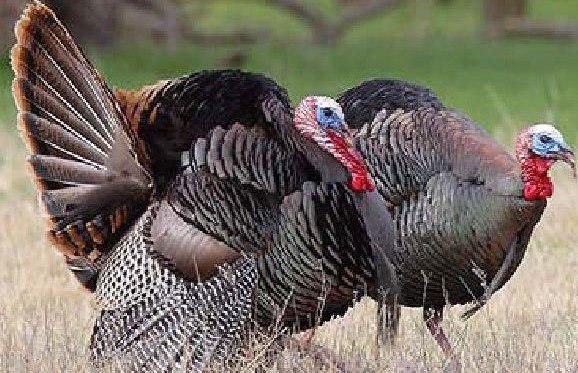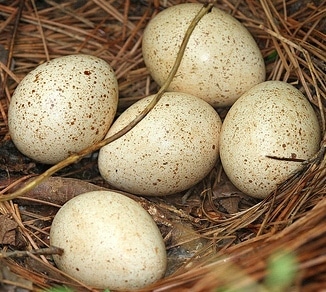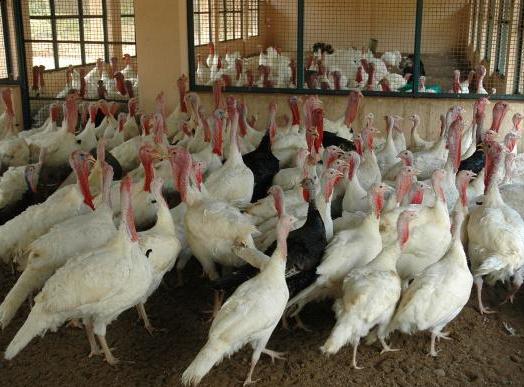Turkey Farming Information:

Introduction: – The turkey “Meleagaris galloparo” is popular bird in American and Europe continent. Commercial line of Turkey has been begun in other parts of world as well. The reason behind why turkey not being popular in India is because, Poultry or Chicken market is already established. As Turkey possesses lean meat, its demand in India also slowly picking up. The Turkey farming is suitable for small and marginal farmers as it can be easily grown in free range or under semi-intensive system with less investment for shelter, equipment and management. Turkey birds are reared for only meat purpose and not suitable for commercial egg production as their growth rate is more compared to chicken. Turkey farming in India can be a best alternative to Poultry Farming, commercial turkey farming in India is slowly gaining popularity. Indian weather suits very well for Turkey Farming and with good management it’s highly profitable farming.

Selection of Turkey Breeds:- This is one of the foremost criteria to be followed in Turkey Farming. The following commercial Turkey Varieties can be raised in India. Among all these breeds breasted white turkey breeds are very suitable for India.
- Beltsville.
- Bronze.
- Bourbon Red.
- Black and Slate.
- Narragansett.
- Small White.
- White Holland.
Housing/Shelter in Turkey Farming:- Good housing is required for proper growth and management of turkey. Turkey can be raised in both free range and intensive systems. Design and Construction of Turkey housing should be same as poultry shed. Deep litter system is preferred as turkeys are big sized poultry birds. Cage rearing is not suitable for turkey farming. People who are not able afford housing or shed for turkeys they can adopt free range turkey farming system. 200 to 300 turkeys can be accommodated in 1 acre fenced land. During night times, turkey requires the spaces of 3 to 4 sft per bird. Turkey can be raised in deep litter system just like the way Poultry or Chicken are raised. In turkey farming, make sure there is enough clean water, space and ventilation. Housing should be protected from all types of predators.

Feeding Management in Turkey Farming:- To maximize proper growth and meat production, nutritious and well balanced food is essential in turkey farming. Usually, the turkeys require about 3 to 3.5 kg of feed to gain 1 kg of body weight. There are lot companies in the market who provide nutritious feed. It is essential to add extra amount of protein food along with the poultry feed. Changing the water frequently make sure healthy and less disease environment.
Disease care and Management in Turkey Farming:- Always proper care is required for better growth and production. Turkeys are like other domestic birds and suffer from diseases. The most common parasites found in turkey farming are fowl mite and round worms. De worming and dipping the birds should be carried to keep them healthy. Turkeys also get affected by various types of bacterial, fungal, bacterial or viral infections. Some of the diseases in turkey farming are erysipelas, fowl cholera, erysipelas, coccidiosis, blue comb disease, arizonosis, new castle disease, chronic respiratory disease, turkey coryza, paratyphoid, turkey venereal disease. Following proper vaccination on time can prevent these diseases and help in proper growth of the birds.
Vaccination Schedule in Turkey Farming:- The common Vaccination schedule in Turkey Farming is given below.
|
Marketing of Turkey:- As turkey meat is lean(low fat) it’s consuming rate is increasing day by day in India. Male turkey becomes for slaughtering purpose within their 2 years age. At this 24 weeks age, they weigh around 10 kg to 15 kg. Female turkeys weigh less than the male turkey and take little more time to gain the weight. Local markets are the best place to market your turkeys. If you are planning for commercial turkey farming in India, it is advised to visit nearest farms to learn about any information or tips in turkey farming. Also you can research market demand for turkey and trends in marketing.
All the best for your Turkey Farming!!
Are you also planning for Sheep (or) Goat Farming in India: Read Here.
I want to do turkey farms .I also have a poultry farm but I want to do as a trial so can you give me a no.or any information that it’s help me
Thank you
Reply me